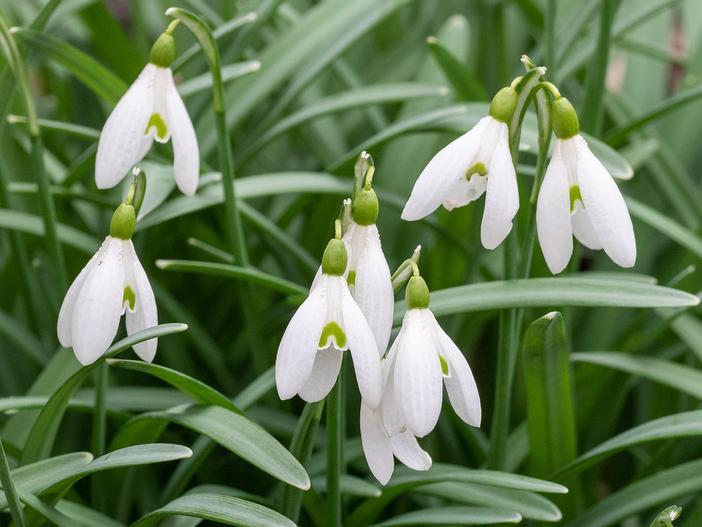Greater Snowdrop
(Galanthus elwesii)
Greater Snowdrop (Galanthus elwesii)
/
/

Bengt Nyman
CC BY 2.0
Image By:
Bengt Nyman
Recorded By:
Copyright:
CC BY 2.0
Copyright Notice:
Photo by: Bengt Nyman | License Type: CC BY 2.0 | License URL: https://creativecommons.org/licenses/by/2.0/ | Uploader: Bengt Nyman | Publisher: Flickr





























































Estimated Native Range
Summary
Galanthus elwesii, commonly known as Greater Snowdrop, is a deciduous perennial herb native to open woodlands and scrubby areas in Southeastern Europe and Turkey. It typically grows to 20–25 cm (7.9–9.8 in) high from a globose bulb, 2–3 cm in diameter. Each plant produces two broad, linear, blue-green leaves. Its flowers are notable for their distinctive globose, white, pendulous appearance, 2–3 cm long, and are usually solitary at the tip of a solid, pointed scape. Greater Snowdrop blooms in the early spring, often while snow is still on the ground, making it one of the first flowers to herald the end of winter.
Greater Snowdrop is valued for its early flowering period, providing a welcome splash of color in late winter to early spring gardens. It is often used in border planting, rock gardens, and naturalized in grass. This plant is relatively low maintenance, requiring medium amounts of water and thriving in soils with medium drainage. It prefers full sun to part shade and is typically propagated by the separation of bulbils after flowering. While generally pest-free, it can be susceptible to gray mold (Botrytis) in overly moist conditions.CC BY-SA 4.0
Greater Snowdrop is valued for its early flowering period, providing a welcome splash of color in late winter to early spring gardens. It is often used in border planting, rock gardens, and naturalized in grass. This plant is relatively low maintenance, requiring medium amounts of water and thriving in soils with medium drainage. It prefers full sun to part shade and is typically propagated by the separation of bulbils after flowering. While generally pest-free, it can be susceptible to gray mold (Botrytis) in overly moist conditions.CC BY-SA 4.0
Plant Description
- Plant Type: Herb
- Height: 0.5-1 feet
- Width: 0.3-0.5 feet
- Growth Rate: Slow
- Flower Color: Green, White
- Flowering Season: Winter, Spring
- Leaf Retention: Deciduous
Growth Requirements
- Sun: Full Sun, Part Shade
- Water: Medium
- Drainage: Medium
Common Uses
Bank Stabilization, Bee Garden, Border Plant, Deer Resistant, Fragrant, Groundcover, Low Maintenance, Rabbit Resistant, Rock Garden, Showy Flowers, Street Planting
Natural Habitat
Open woodlands and scrubby areas in Southeastern Europe and Turkey
Other Names
Common Names: Giant Snowdrop, Elwes’s Snowdrop, Elwes-Schneeglöckchen, Großblütiges Schneeglöckchen, Groot Sneeuwklokje, Turkisk Snödroppe, Stor Snödroppe
Scientific Names: , Galanthus elwesii, Chianthemum elwesii, Galanthus elewesii, Galanthus elwesii var. major, Galanthus graecus, Galanthus graecus f. maximus, Galanthus graecus var. maximus,
GBIF Accepted Name: Galanthus elwesii Hook.f.